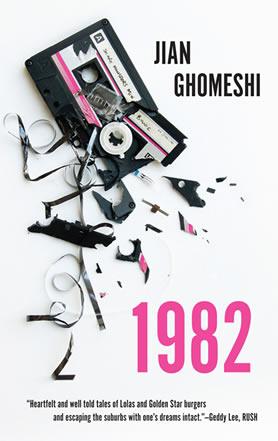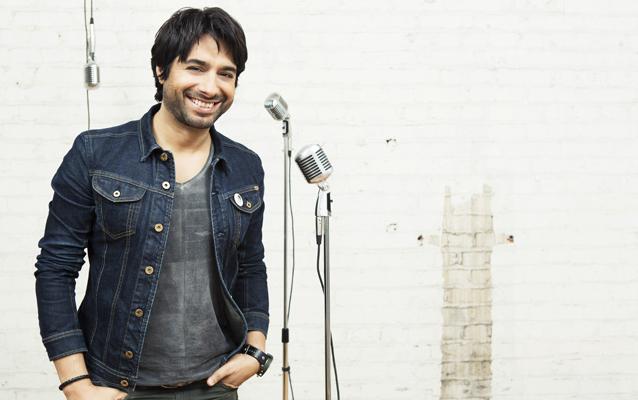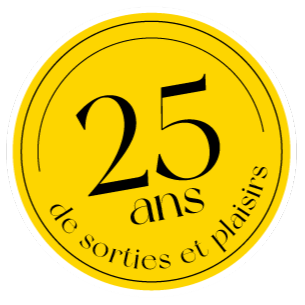Jian Ghomeshi discusses Arcade Fire, Quebec values and the art of the interview
Auteur: Michael-Oliver HardingWhether he’s speaking with Chinese dissident and artist Ai Weiwei, Nine Inch Nails frontman Trent Reznor or American Apparel’s Dov Charney, whether he’s exploring thorny topics such as as mixed martial arts for kids, gay rights in Russia or a controversial Thai TV drama, CBC broadcaster Jian Ghomeshi always brings warmth, intelligence, context and an unquenchable curiosity to the table. Q, the flagship culture program he has hosted since it first went on the air in 2007, provides Canadians with a fresh take on public broadcasting – one that’s undeniably savvy and engaging, interested in both long-form political interviews and spirited pop culture debates, but also one that’s, to use a totally uncool qualifier, quite “hip.”
Ghomeshi, who took home the Gold Award for Best Talk Show Host in 2012 at the New York Festivals International Radio Programs & Promos Awards, brings his show to Théâtre L’Olympia this Thursday for a live taping as part of Pop Montréal. The esteemed host has proven to be one of Quebec’s greatest allies and advocates in English Canada, regularly shining a spotlight on local talents. This will be no exception, as his slate of Quebec guests includes musical maven Patrick Watson, experimental-pop act BRAIDS, mystery novelist Louise Penny, actor Antoine Bertrand and stand-up success Sugar Sammy. Nightlife.ca recently caught up with Ghomeshi to broach Quebec values, the art of the interview and Arcade Fire’s commitment to creativity.
 NIGHTLIFE.CA: We chatted last year on the morning of your book launch, when you spoke of being “a jumble of nervous excitement.” Recently, the paperback version of 1982 made the top 10 Canadian bestsellers list, close to a year after the hardcover’s original launch. What’s that ride been like for you?
NIGHTLIFE.CA: We chatted last year on the morning of your book launch, when you spoke of being “a jumble of nervous excitement.” Recently, the paperback version of 1982 made the top 10 Canadian bestsellers list, close to a year after the hardcover’s original launch. What’s that ride been like for you?
Ghomeshi: Pretty incredulous for most of it. I anticipated that there would be some attention around the book and people would happen to pick it up if they’re interested in what I do, but honestly I truly didn’t know what to expect beyond that. The book continued to garner attention and positivity and sales throughout the fall, and then to do so again with the paperback coming out has just been really humbling.
Have you gained any new insights about the art of the interview through promoting your book from coast to coast?
Yeah, it’s been really instructive. It was interesting to see that the things I believe about what makes a great interview were also true in the interviewee chair. I also discovered that there are some great, thoughtful, interesting journalists and media folks right across this country, and there’s a bunch who don’t do their research and who didn’t read the book (laughs), and who were disappointing as well. I got the whole gamut, and I think that’s a reflection of our current media culture.
As a Quebecer listening to your program, what’s interesting about the myriad Quebec stories you cover – whether they be cultural, social or political – is that they give us a strong indication of how they'll fare in the Rest of Canada (ROC). Do you have people on your team who specifically track the Quebec beat?
Yeah, we have a couple of people on our team who spent some time living in Quebec, and one person from Montreal, but we also have – as we do in general –a lot of people on the ground that we touch base and interact with. We’ve developed an infrastructure – contacts, sources and friends of the show from different parts of the world, and certainly in Quebec. People to give us a sense of what’s percolating in the cultural zeitgeist in Quebec. Now having said all of that, we put together a curatorial program, so we put on what we like. Everything that we put on the show, I have to feel as though it’s something I want to promote. It’s significant real estate, at this point, to get on our show, so it’s things we like or are really worthy discussion points. We’re not governed by some kind of mandate; it’s all by instinct.

You’re a big supporter of Quebec culture, so I’d be curious to get your take on the PQ’s proposed Charter of Quebec Values, which you’ll be discussing during a special Montreal edition of Q’s Media Panel – with Marc Cassivi (La Presse), Bernard St. Laurent (CBC) and Lise Ravary (Journal de Montréal). There is a strong divide within Quebec, but an even greater opposition to the project in the ROC. Do you think it’s the umpteenth example of Canada’s “two solitudes” at play?
I think so, yes. Part of it is that the ROC can feel particularly confounded by some of the decision making that is made in Quebec when it’s seen from the outside, and part of the problem is that there is a true lack of context and education and experience with where Quebecers are coming from… That’s not to say that if we all lived in Quebec, we wouldn’t still find the Charter of Quebec Values problematic or even offensive. But we would understand the nuances more and the history of where it’s developed more.
Knowing that there are a significant proportion of people in Quebec who do support this, knowing that these people aren’t all racist or looking to denigrate other folks, knowing that there are nuances here we don’t understand, that’s an important part of why we did a Q debate on the Charter a few days ago. I went into that really trying to understand the so-called secularist position to find out where they’re coming from. But it’s a real challenge when we live in these solitudes, for sure. It’s an ongoing project that we have to work on – lowering those fences and understanding these solitudes.
As a self-avowed Arcade Fire fan, what's your take on the minor backlash that followed the band’s string of Montreal “secret shows,” with varying accounts of fans being roundly dismissed after waiting in line for hours?
I would start with a disclaimer that I don’t know all the details, I read and heard about it. But I really, truly believe that Arcade Fire are quite brilliant, and I think because they’re so good, in many ways way ahead of a lot of other artists around the world – in terms of their innovation, what they’re doing, the new single they’ve released, the direction they’re going in, the way they roll things out, their commitment to creativity – they have a microscope on them and they have their detractors that come from them being as critically popular as they are. There’s going to be bumps along the way and there’s going to be issues that happen. Having gotten to know them a bit and a sense of them as people, I think there’s a real commitment in Arcade Fire to creativity, to the music, to a sense of democratically sharing what they do with the world. And I would say some of it this stuff is just the collateral damage that comes with being as big a band as they are, and the microscope that follows with it.
Q Live at POP Montréal, with Patrick Watson, BRAIDS, Louise Penny, Antoine Bertrand and Sugar Sammy
September 26th at Théâtre l'Olympia from 7–9 p.m.
popmontreal.com | cbc.ca/q











